- Home
- Mack Reynolds
The Case of the Little Green Men Page 3
The Case of the Little Green Men Read online
Page 3
She smiled, boasting even white teeth and bringing attention to the fact that her lips needed only the faintest touch of red to show them to the best advantage. “So am I,” she admitted. “Sometimes I think I come around just for the laughs. Heavens, how can you people get so serious about it? Time travel, trips to the moon, interplanetary warfare; sometimes I wonder how anyone like — well, say Jim, can get worked up about such things.”
I was supposed to be one of them, so I said, “Some people go nuts about historical fiction. I think it shows more awareness to be interested in the future, especially in these times.” That sounded like a plausible answer; maybe a bit stuffy, but plausible.
She let me mix her another drink, Scotch and water, and when I’d finished it she took the glass and said, “Well, here’s to the Bems.”
“Yeah,” I answered vaguely, and took a gulp of my applejack. I wondered what a Bem was.
Her eyes narrowed almost imperceptibly and she started to say something just as Harold Shulman, his clothes as baggy as ever, and his eyes blinking rapidly behind his heavy-lensed specs, rambled into the kitchen from the garden.
“Here you are,” he said shrilly, sounding as though I should be somewhere else.
“Hello, there, Harry,” I said, assuming that we were supposedly old friends. I wished that the three of them had briefed me more on just what sort of a game I was supposed to play. For all I knew, part of my job was to suspect Julie Sharp of being a visitor from Venus. As far as that went, for my money she was Venus herself. Shulman would have done me a big favor by staying away for another five or ten minutes.
“Hi, Miss Sharp,” he said; then, “You getting acquainted, Jeb? Maybe I better introduce you around.”
Julie told him hello, and I sighed inwardly and said, “All right; wait until I get another drink.” I had a sneaking suspicion that Julie Sharp was the only person at the party that I really cared about meeting and that I could stand a degree of fortifying.
I got my drink, said half a dozen words to Julie to the effect that I was looking forward to seeing her again, and was hauled off by the gangling Shulman. Her eyes laughed after me and I got the feeling that I wasn’t kidding her.
Harry Shulman ushered me into the garden, whispering in a conspirator’s voice, “Discover anything yet?”
I looked at him plaintively. “Listen, I’ve only been here ten minutes. What did you expect, a flock of handcuffed Martians?”
He didn’t recognize the sarcasm. He had me by the arm and was leading me to a semi-quiet corner of the garden back toward the rear, near the hedge. “I thought you wanted to introduce me around,” I said.
“I’ll do that shortly,” he told me, trying to keep his shrill voice low. “First, I wanted to show you something.”
Well, the liquor was good, at least one of the girls was better, and I had an idea that the overgrown refrigerator would be full of the kind of food I haven’t been able to afford for many a moon. Who was I to complain when I was getting paid for that kind of treatment?
He led me to the shady cover of an old tree, well away from the nearest group of wrangling fans. There was a heavy wooden bench beneath the low branches, and we sat down. He brought a fold of mimeographed and stapled papers from an inner pocket. “I wanted to show you this,” he said.
“All right, what is it?”
He handed it to me. “It’s my fanzine,” he said shrilly. “You’re an outsider and I’d like your unbiased opinion.”
Here we went again.
“What’s a fanzine?” I asked, holding it up so I could see it in the dim light. The cover sported a semi-nude girl, standing in front of what I supposed was a spaceship.
He explained while I thumbed through it. “In science fiction you have prozines and fanzines. The prozines — professional magazines — are the regular commercial publications like Imagination and Super-Science and Fantastic Adventures.”
I cued him, “And the fanzines?”
“Well,” he pointed at the sheaf of mimeographed pages I held, “that’s a typical fanzine. Most fen would like to write themselves, but since they can’t make the grade in the prozines — not at first, at least — they put out these fanzines and print each other’s stories, articles and art work.”
I looked at it with more interest. “You mean the science fiction fans go to all the trouble to put these things together just for a hobby?”
He was indignant. “You should see some of them. Some of the fen can afford to print or planograph theirs. You should see Bob Tucker’s Science Fiction News Letter.”
I got back to the point. “All right, what did you want me to do with this?”
He blinked at me earnestly. “Well, part of your job involves finding out all about fandom, and fanzines are a major part of fandom. I thought you might as well get your impression of the fanzines from my Off-Trail Fantasy as any. I’d like to have your opinion of some of the stories. There’s one in particular that I did myself called Ultimate Destiny.”
There was a wistful note in his high voice.
“All right,” I said, folding it lengthwise and putting it into an inner pocket. “I’ll read it.”
“Don’t you want to read it now?” he asked, blinking again.
“Listen, Harry,” I said, noting my glass was empty, “you hired me to check on whether or not any extra-terrestrials — ” I’d picked up that word in the stories I’d been reading all afternoon — “were hanging around your affairs. I don’t think sitting here reading your magazine is going to get me very far along in that direction.”
He began to say something, but didn’t. Instead, he thought a minute. Finally, “Well, let me know what you think when you do finish it.”
“All right,” I told him agreeably. I got to my feet. “Now do you have any ideas on where I should begin checking on your aliens?”
Harry Shulman moved the thin shoulders inside his ill-fitting coat, still looking disappointed. “I’ll introduce you to some of the others,” he said. “I guess it will have to be up to you to think of some angle.”
For the next fifteen minutes, I was taken from one group to another, being introduced around. James Maddigan had said that most of those present wouldn’t know my purpose; from what I could see, none of them did. Among others, Shulman introduced me to Art Roget, both of them pretending that Roget and I hadn’t met before. I didn’t get it, but it was all right with me.
Maddigan — the older Maddigan — was in one of the groups too. He said hello cheerfully enough, but made no particular indication that we were acquainted. For my dough, they weren’t handling it very well. James Maddigan, according to the story I’d told his nephew, was supposedly my friend and sponsor in science fiction circles.
But it wasn’t my money. Why should I care how they wasted it?
Shulman drifted away after a while and I stopped with one group long enough to get involved in an argument about a writer named Kuttner. I was on fairly firm ground, since I remembered reading one of his stories that afternoon. I held my own.
Later — several drinks later — I found myself in a circle discussing whether or not pen-names should be used by authors. It turned out that some of the science fiction writers — Kuttner among them — had a half-dozen or more pseudonyms. One group of the debaters was of the opinion that this was fine; the other wanted a writer to have just one by-line even though several of his stories appeared in the same issue of a magazine. I couldn’t see that it made much difference and made the mistake of saying so; both sides teamed up to give me the oatmeal look. I wandered off for another drink and maybe a snack from the kitchen. Besides, I wondered where Julie Sharp was.
She wasn’t in the kitchen. James Maddigan was. He stood to one side of the table which held the liquor supplies, arguing with a slightly plumpish, ultra-sophisticated-looking blonde, who was as out of place at this party as an icicle on the hot side of Mercury.
She must have been a bit older than Julie Sharp — probably pushing thirty. Hollywood might have s
aid, Jean Harlow type, and left it there, and been pretty accurate, too. Her looks were half God-given, half store-boughten; but on her you didn’t mind. She had a wide mouth, full kissable lips, and a nice nose which you didn’t see too much of since your eyes continually came back to that full mouth. Her eyes were hard to explain; somehow you got the feeling that something was missing in them, a something that once was called breeding.
Maddigan knocked it off when I entered, but he was still frowning when he said, “Sandra, may I present Mr. Knight, a newcomer to fandom? Jeb, my wife.”
So not even his wife was in on my identity. Perhaps he suspected her of being from Saturn or some such. She must have been at least fifteen years younger than he, and by the manner in which she let her eyes run up and down me, the difference in years was beginning to tell in their home life.
We went through the formalities, and her hand was just a touch suggestive, stayed just a fraction too long in mine.
I said, by way of making conversation, “Have you been a fan long, Mrs. Maddigan?”
She pouted — prettily — but I hate women who pout. “I’m not a fan,” she admitted. “I just come to keep tabs on Jim.” It was probably meant to be humorous, but I had a feeling that the checking was going the other way.
Maddigan puffed out his heavy lips and said, “How are you progressing, Jeb?”
I let my right shoulder rise and drop. “Still at the stage of getting my bearings,” I told him. Actually, I was at the stage of getting good and tight.
“Don’t forget the detailed reports,” he said, waggling a thick finger at me. “Very important.”
“All right,” I said agreeably. I wondered what the devil he expected to find in a report; possibly some account of my trailing a Martian up and down the city in taxicabs.
“What report?” Sandra wanted to know. There was a faint suspicion in her voice and in her narrowed eyes.
He covered admirably. “Mr Knight, my dear, is checking up on some real estate for me.”
So that was his line: real estate. At least the Scylla Club boasted variety. Harry Shulman had introduced me to editors and publishers, and a half-dozen doctors of this and that; mingled with them had been a dozen or so clerks and housewives, a half-dozen students and even a ship’s officer. Science fiction evidently wasn’t confined to one stratum of society, one age, or one sex. As a matter of fact, Maddigan alone seemed out of place, actually; a stuffed shirt of a businessman in surroundings that before yesterday I’d have thought were suitable only to inmates of nut factories.
Most of those I’d met seemed considerably above average in perception and education. I’d given up wondering why they’d selected time travel and trips to Mars as their hobby when there were things like wine, women and whistling running around loose.
We were tossing light bits of conversation back and forth, but there was still a tension between Maddigan and his frau, and I began looking for an excuse to cut it off and wander elsewhere. Besides that, I still wanted to locate Julie again.
I opened my mouth to say something just as Art Roget came in. His Jimmy Stewart grin was conspicuously gone; his face reflected shock and disbelief, and he stumbled awkwardly over the doorstep as he entered. You didn’t need intuition to know something was wrong.
He muttered, as though to himself, “I’ve got to call an ambulance. Harry’s dead; he’s squashed all over, like he fell from a tall building. I’ve got to call the police — or somebody.” He made his way past us and into the hallway, looking for the phone.
It took a full minute to put together what he’d said. In spite of the expression on Roget’s face, my first impression was that it must be a gag. But there was a loud, agitated hum, rapidly increasing in volume, emanating from the garden.
Maddigan was the first to speak. He said, “Squashed all over? That’s nonsense; the highest building in this vicinity isn’t more than three stories.”
CHAPTER FOUR
It was nonsense, all right. Utterly impossible, but there it was. What had been Harry Shulman, a shrill-voiced, nervous little guy who took his science fiction seriously, was now a flattened, gory mess rivaling anything I’d seen in the war.
He was less than a dozen feet from the bench where we had sat talking about his fanzine, or whatever he called it, perhaps an hour or so earlier. Face down on the ground, the best description I could give would be to repeat what Art Roget had said — “He’s squashed all over, like he fell from a tall building.” I doubted that there was a whole bone left in his body.
I turned my face away as quickly as the next one.
James Maddigan was standing behind me, his eyes popping and his jowls quivering. He opened his mouth a couple of times as though to blubber something, but closed it again. I headed back toward the house and he followed me.
The club members were milling around like a mob without a leader, several of them semi-hysterical. One girl stood in the middle of the garden swaying, her hands held to her stomach, her mouth open and stupid with shock and with whimpering noises coming from it. I could hear someone else being sick behind a lilac bush. Three or four of the guests had taken one look at the body and had made a beeline for the house, probably bound for their hats and the front door. Sandra led them.
James Maddigan blurted, “Shouldn’t you take over, Knight? Shouldn’t you attempt to …”
We had regained the kitchen by now. The wonderful bun I’d been building all evening was gone. I reached for the bottle of applejack and gurgled a stiff drink into a dirty glass sitting there on the kitchen table, not taking the time to locate a clean one.
“Why me?” I growled at Maddigan. “Didn’t your pal Roget phone the police? They’ll be taking over soon enough.”
“But shouldn’t someone,” he motioned nervously with his head toward the garden, “tell them not to touch the body, or whatever it is you tell them until the police arrive?”
“All right,” I said. I took another deep swallow. “It’s all right with me. You tell them. Not that anybody’s going to touch that body.”
“Yes, but you’re a detective; you know the procedure.” He was staring at me as though I were out of my mind. His overbearing pomposity was gone.
I glowered back. “Why? Do I look like Philip Marlowe or Michael Shane? I’ve never seen a murder before in my life.”
“Murder?” His eyes blinked rapidly, for a brief moment reminding me of young Shulman who wasn’t going to be doing any blinking ever again.
I finished the applejack and poured another; the first hadn’t done me much good. “Listen, make up your mind,” I told him impatiently. “First you get all excited about not touching the body, and about getting the police, and preventing everybody from leaving; now you’re shocked because I mention the word murder.”
He blinked again. “I suppose you are correct. I knew it from the first, but murder … Perhaps he fell from the tree.”
I snorted. “Yeah. But anybody that got that splattered from falling out of a tree must have been climbing a redwood, not an oak, or whatever that is out there.”
“Well — still, someone should tell them they must not leave until the police arrive.”
“All right,” I said placatingly, “let’s go. You go out into the garden and tell them; I’ll go into the hall where the coats and hats are.”
The sirens started screaming a few minutes later, and the next half-hour was principally a madhouse of arriving cops, homicide detail men, ambulance and medical examiners.
I cornered the rest of the fifth of applejack and went back into the garden and found a bench as far away from the remains of Harry Shulman as I could. The apple didn’t do me much good, but I worked away at it carefully and didn’t think about anything at all until a patrolman came to get me.
He said, “You been inside to talk to the lieutenant yet?”
I came to my feet and sat the nearly empty bottle down on the ground. “No,” I admitted. “Let’s go.” There was warm moisture in my palms.
> A couple of uniformed officers, one of them taking shorthand notes, and two plainclothesmen were in the living room. They looked tired.
The patrolman who’d rounded me up said, “This is Lieutenant Philip Davis; he’s in charge,” and left the room again.
Davis looked up at me from where he sat on a heavy leather couch. “Where’ve I seen you before, eh?” He stared at me out of a pair of cold pale eyes set close to a narrow nose. His skin stretched tight over his face, and you got the impression that he needed lots of good food and lots of sunshine, but that he probably wasn’t interested in acquiring either. He was small, belligerent and feisty.
I didn’t remember ever having seen the patrolman who was taking the shorthand, but he looked up and said, “It’s Jeb Knight, Lieutenant; Lee and Knight. He used to be Ken Lee’s partner.”
Lieutenant Davis shot a quick glance at me, as though seeing me for the first time. His rasping voice didn’t go with his small body. He sneered, “Oh, yeah. Jeb Knight, special investigator. You’re the genius who handled that Holliday matter, eh? How come you’ve still got a license? Or have you?”
I’d been expecting this. I wished that I’d had better results from the fifth of applejack in the garden. I said, “Yes, I’ve still got my license.”
Davis snorted, “Why the devil did Ken Lee ever pick you for a partner, eh? Lee was a pretty good man.”
I said, “We knew each other during the war, Lieutenant.”
The detective lieutenant crossed his legs, revealing overly pale skin above a garterless sock. He said, less nastily now, “Why you stick in the detective racket with no more on the ball than you have I don’t know, but that’s your business.”
“Yeah,” I said tonelessly.
He shot another of his quick glances at me, to see if I was being sarcastic. He said, “I’ve had about twenty of this gang in here already and I haven’t got enough out of them even to begin with. Maybe you can do me some good, eh?” His tone of voice suggested that he wasn’t very hopeful.
“I’ll do what I can, Lieutenant. I’m afraid it’s not much.”

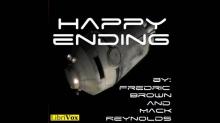 Happy Ending
Happy Ending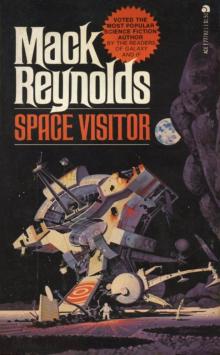 Space Visitor
Space Visitor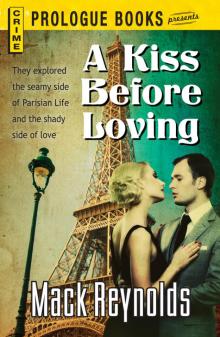 A Kiss Before Loving
A Kiss Before Loving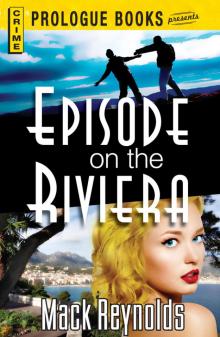 Episode on the Riviera
Episode on the Riviera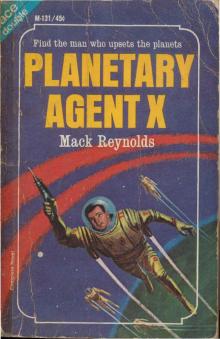 Planetary Agent X
Planetary Agent X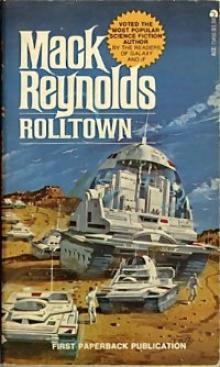 Rolltown bh-3
Rolltown bh-3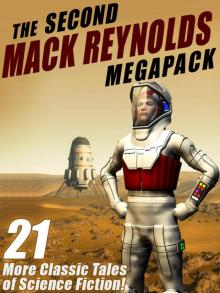 The Second Mack Reynolds Megapack
The Second Mack Reynolds Megapack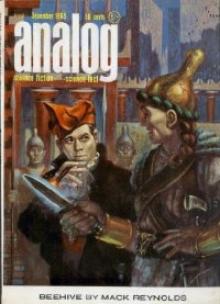 Dawnman Planet up-2
Dawnman Planet up-2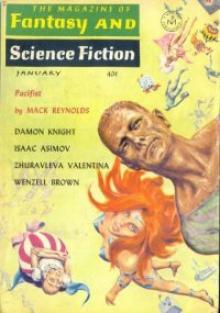 Pacifist
Pacifist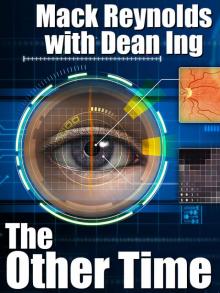 The Other Time
The Other Time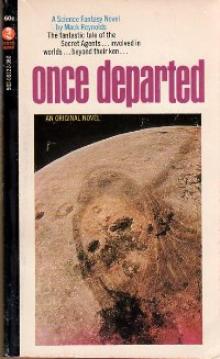 Once Departed
Once Departed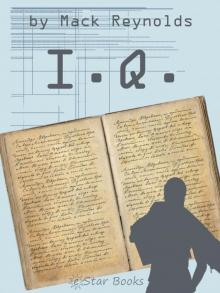 IQ
IQ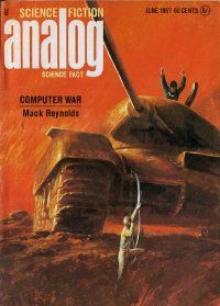 Computer War
Computer War Earth Unaware
Earth Unaware The Rival Rigelians up-3
The Rival Rigelians up-3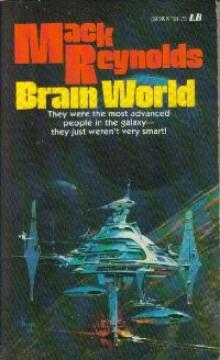 Brain World up-7
Brain World up-7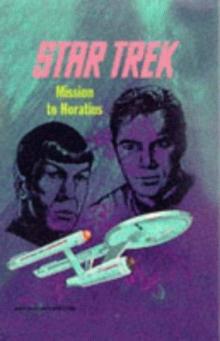 Star Trek - TOS - Mission to Horatius
Star Trek - TOS - Mission to Horatius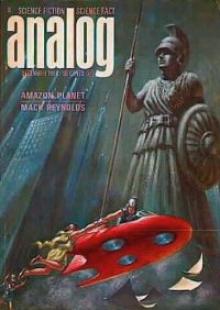 Amazon Planet up-5
Amazon Planet up-5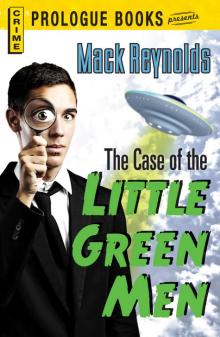 The Case of the Little Green Men
The Case of the Little Green Men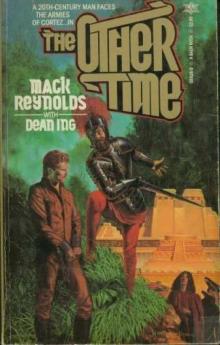 Other Time
Other Time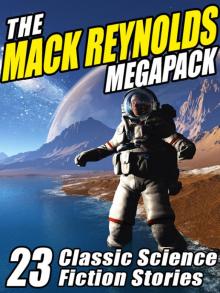 The Mack Reynolds Megapack
The Mack Reynolds Megapack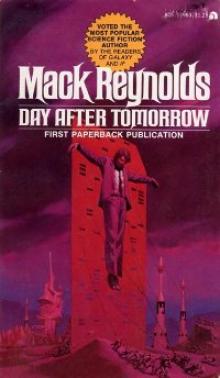 Day After Tomorrow
Day After Tomorrow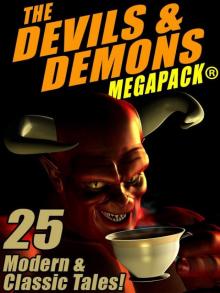 The Devils & Demons MEGAPACK ®: 25 Modern and Classic Tales
The Devils & Demons MEGAPACK ®: 25 Modern and Classic Tales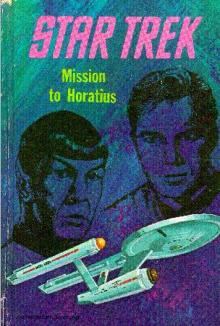 Mission to Horatius
Mission to Horatius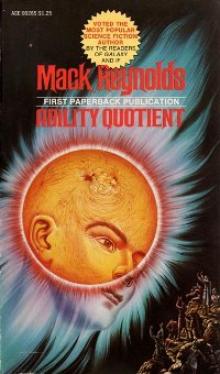 Ability Quotient
Ability Quotient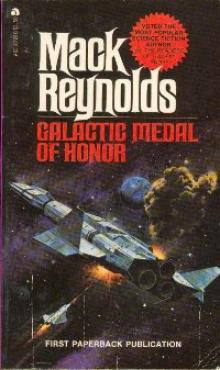 Galactic Medal of Honor
Galactic Medal of Honor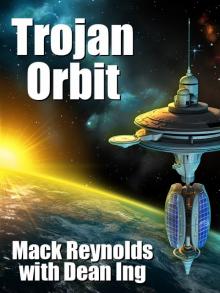 Trojan Orbit
Trojan Orbit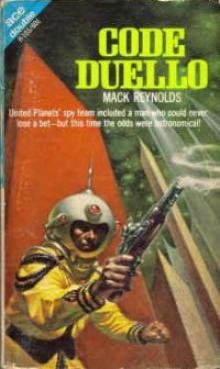 Code Duello up-4
Code Duello up-4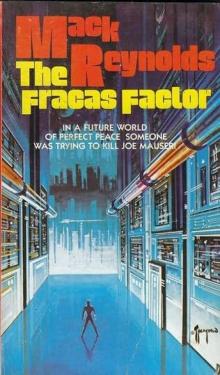 The Fracas Factor
The Fracas Factor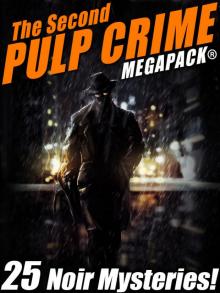 The Second Pulp Crime
The Second Pulp Crime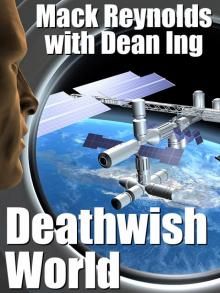 Deathwish World
Deathwish World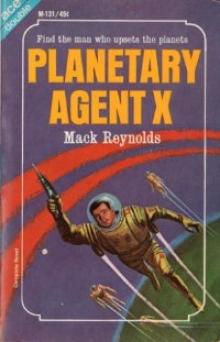 Planetary Agent X up-1
Planetary Agent X up-1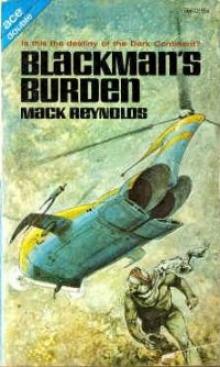 Blackman' Burden na-1
Blackman' Burden na-1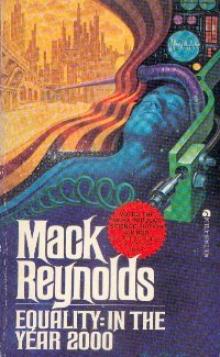 Equality: In the Year 2000 jw-2
Equality: In the Year 2000 jw-2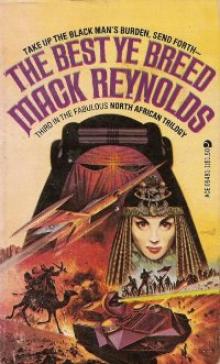 The Best Ye Breed na-3
The Best Ye Breed na-3 The Jet Set
The Jet Set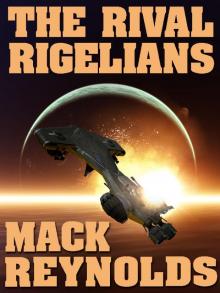 The Rival Rigelians
The Rival Rigelians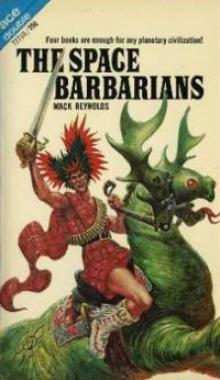 The Space Barbarians
The Space Barbarians